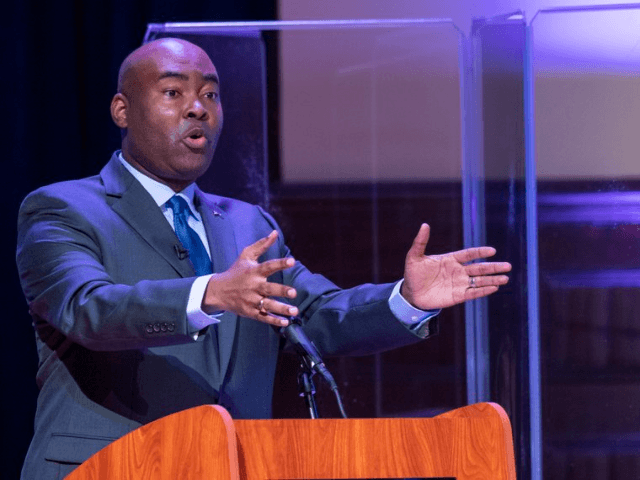Sen. Lindsey Graham’s (R-SC) challenger, Jaime Harrison (D), opposes school choice, a position that has him at odds with most black Americans.
The Post and Courier has detailed the vast achievement gaps between white and black students in South Carolina:
Divided by race, mired in inequities and hobbled by its history, South Carolina’s public school system is among the worst in the nation, saddled with a legacy of apathy and low expectations that threatens the state’s newfound prosperity.
In a candidate questionnaire on education issues, the Post and Courier asked Graham and Harrison (pictured):
Do you support the expansion of charter schools or private school vouchers to help families afford to send their children to the school of their choice?
Graham responded that parents should make the choice of how their children are educated:
The school a student attends and the opportunities afforded to them should not be dictated by a ZIP code. Charter schools and vouchers provide parents the power and resources to determine their child’s education journey … We must continue to think outside the box when it comes to educating our students because what we have been doing is not working for everyone in South Carolina. I’m a product of public education, and we have many outstanding public schools across the state, but when our public schools fail, parents and children deserve alternatives.
Harrison, however, expressed opposition to school choice, favoring, instead, investing more financial resources into failing public schools:
It worries me when we divert desperately needed public resources to private institutions, particularly at a time when our local and county governments are suffering from a steep decline in tax revenue. We still have so long to go to achieve educational equity in this state, with our rural public school students having some of the lowest math and reading scores in the nation. The Constitution of South Carolina only calls for the government to provide a “minimally adequate” education, but in 2014, the state Supreme Court ruled that many districts weren’t even meeting that standard. We need to make sure that schools in our poor and rural communities get the resources they need for all children to achieve.
Harrison’s stance on school choice reflects that of Democrat 2020 nominee Joe Biden and the national Democrat Party.
When we divert public funds to private schools, we undermine the entire public education system. We've got to prioritize investing in our public schools, so every kid in America gets a fair shot. That's why I oppose vouchers. #Espinoza
— Joe Biden (@JoeBiden) January 23, 2020
Backed by the teachers’ unions, Biden has repeated his intention, if elected, to provide even more funding to traditional public schools and to ensure no public funds are given to parents to choose other schools they believe will offer their children a better education.
Instead of embracing charter schools, the Democrat Party’s 2020 platform has called for greater scrutiny of them.
“Democrats believe that education is a public good and should not be saddled with a private profit motive, which is why we will ban for-profit private charter businesses from receiving federal funding,” the platform states, adding that Democrats will use “accountability” regulations to ultimately turn charter schools into regular public schools:
We support measures to increase accountability for charter schools, including by requiring all charter schools to meet the same standards of transparency as traditional public schools, including with regard to civil rights protections, racial equity, admissions practices, disciplinary procedures, and school finances.
Harrison’s decision to stick with his party on the issue of school choice, however, leaves him at odds with most black Americans.
Several recent polls confirm black and Hispanic Americans, as well as whites, overwhelmingly support school choice.
One national poll commissioned by the American Federation for Children in January 2019, found 67 percent of voters support school choice, including 73 percent of Latinos, 67 percent of blacks, and 68 percent of whites.
Another poll released in August 2019 by Education Next found black Democrats approve of targeted vouchers, universal vouchers, and charter schools at 70 percent, 64 percent, and 55 percent, respectively, and Hispanic Democrats approve at 67 percent, 60 percent, and 47 percent.
A third poll, commissioned by school choice proponents Democrats for Education Reform, and released in October 2019, found 81 percent of Democrat primary voters, including 89 percent of black Democrat primary voters, support a proposal to “expand access to more choices and options within the public-school system,” including charter schools.
Yet another survey released at the end of September by the Manhattan Institute also revealed 66-70 percent of likely voters in five battleground states either strongly or somewhat supported the concept of publicly funded K-12 school choice. Moreover, support for publicly funded school choice was higher among blacks, at 65-77 percent.
A coalition of black pastors in Kentucky met with Education Secretary Betsy DeVos and the Bluegrass Institute (BIPPS) this week to call for “immediate education reform – including school choice,” BIPPS reported.
Pastor Derek Wilson of the Spirit of Love Center, helped found Destiny Academy, which has begun its third year of educating low-income students.
According to BIPPS, Wilson explained his church started the school because they “were tired of seeing so many young African-American children fall through the cracks.”
The pastor added he believes the county public school system has shown a form of “institutional racism” and that its monopoly on the education system has led to much of the devastation in the black community.

COMMENTS
Please let us know if you're having issues with commenting.